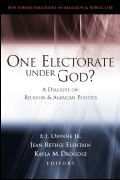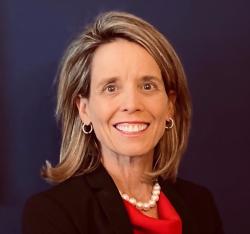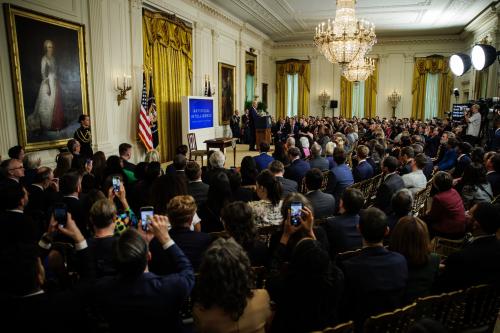Last week, the White House unveiled new regulations as part of the “faith-based initiative’s effort to spread compassion in our country and make sure that the most effective programs are funded.”
On the other end of Pennsylvania Avenue, the House of Representatives passed the “Charitable Giving Act of 2003” complete with a “Sense of Congress” statement claiming that “faith-based organizations are often more successful in dealing with difficult societal problems than government and non-sectarian organizations.”
It’s also worth mentioning that there are more than $65 billion in grant funds available to faith-based and community organizations, spread across six federal departments and more than 30 government agencies, not to mention the ad-hoc participation of a variety of other federal entities (Homeland Security, FEMA, Veterans Administration).
Like it or not, the train has left the station on the faith-based initiative. The problem for proponents and opponents alike is that little is known about the implementation of this far-reaching program.
For instance, how effective has the administration been in terms of channeling federal dollars to these organizations?
The White House itself does not even know how many faith-based organizations have applied for funding, how many have been successful or how much money these groups have been awarded.
What about quality? Do faith-based organizations provide better services? How do they compare to government providers?
The central problem is that we are never going to know the answers to any of these questions unless a rigorous data-collection operation is put in place. Sure, there are social scientists conducting important research. But as Congress gears up for numerous reauthorizations, there is no systematic or comprehensive effort to track the federal dollars earmarked for the programs.
That’s why it’s the perfect time to ask Congress to establish a centralized data collection system that requires agencies to report the number of faith-based and community organizations receiving money, how much they receive, what services they perform and how they stack up after an independent evaluation.
Of course, it won’t be easy. The Pew-funded Roundtable on Religion and Social Welfare Policy identifies a number of complicating factors: the presence of voucher programs, the difficulty in defining “faith-based” organizations, the involvement of intermediaries (who ultimately determine which faith-based groups get funding), and formula grants (that allow state and local government agencies to identify grant recipients).
But with rigorous requirements mandated by Congress, every effort should be made to collect detailed data. This information is vital to ensuring an informed debate on faith-based initiatives and creating the public confidence vital to their long-term success.
As John DiIulio, the first director of the White House Office of Faith-based and Community Initiatives, noted in the initial administration report on the faith-based initiative, “Few federal funding programs have undergone a thorough evaluation.”
This was true in 2001 and remains true today. Congress frequently passes “good government” legislation that requires greater transparency and accountability in an effort to enhance its oversight role. Let’s put members of Congress and the president alike in a position to proclaim the virtues of the faith-based initiative, but let these claims be rooted in fact, not hope.








Commentary
Op-edNeed Facts to Promote Faith-based Initiatives
October 8, 2003